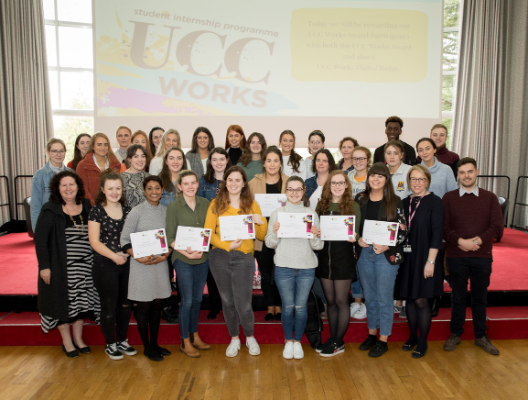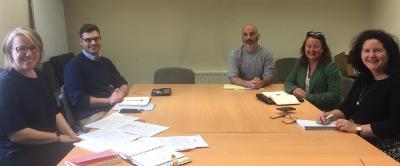In This Section
- CIRTL Homepage
- Meet our Team
- Resources
- Short Guides
- Short Guide 1: Starting Well
- Short Guide 2: Scaffolding Learning
- Short Guide 3: Icebreakers
- Short Guide 5: Discussions for Online Learning
- Short Guide 4: Visualising Thinking
- Short Guide 6: Universal Design for Learning
- Short Guide 7: Group Work
- Short Guide 8: Reimagining Practicals
- Short Guide 9: Assessment in the Age of AI
- Sustainable Development Goals Toolkit
- Group Work
- Connected Curriculum
- Civic Engagement Toolkit
- Learning Outcomes
- DigiEd Reading List
- Ethical Use of GenAI Toolkit
- Short Guides
- Professional Development
- Events
Prepare Students for CE Initiatives

The article focuses attention on the process of preparing students for their CEL experience so that they can maximize the experience but also understand the purpose of such initiatives and consequently what is expected of them. Here we delve into an example of how a UCC lecturer in prepares her students for their CEL experience.
Some CEL initiatives are designed so that the coordinating lecturer accompanies students and participates alongside community and student participants throughout the CEL experience. In other CEL projects, students engage with community partners without their lecturer. In both instances, ensuring students are adequately prepared to engage with their community partner(s) is important but especially so where the lecturer is not present to guide developments or manage sensitivities should they arise.
Preparing Occupational Therapy Students for a Formative CEL Experience

Image: Eithne Hunt (Occupational Therapy, Lecturer), Paul Geeleher (UCC PLUS+), Shane Horan (UCC Works), Eleanor Donoghue (UCC Career Services) and Maeve Minihane 2019 (UCC PLUS+)
Background to the Module
In 2013, Dr. Eithne Hunt designed a new first-year Occupational Therapy module OT1004 Becoming a Healthcare Professional. Reflecting trends in higher education towards service learning and active citizenship, she incorporated a requirement for her students to independently source and engage in voluntary work and made this the focus of the end of module assignment. In 2016, when changes to GARDA vetting made it more difficult for the Occupational Therapy students to secure volunteering opportunities in a sufficiently timely manner, Eithne approached UCC PLUS+ to seek to formalize a partnership such that all first-year Occupational Therapy students would become Homework Club (HWC) tutors.
UCC PLUS+ Homework Clubs is an award-winning initiative (Best Education Outreach Award in the Irish Education Awards 2019). The intention behind the CEL experience is to help first-year Occupational Therapy students to develop values, skills and aptitudes that promote civic participation, social inclusion, and employability and other attributes essential to thrive in learning and life within and beyond UCC
Our Homework Club tutors all had a fantastic first week! Thank you to our linked schools for the warm welcome and see you next week! pic.twitter.com/mgYZv4kS5o
— UCC PLUS+ (@UCCPLUS) January 29, 2020
OT1004 is a mandatory module for 1st year students where, in addition to their weekly 2 hour lectures, they volunteer in DEIS schools as homework tutors to secondary school students (1st, 2nd and 3rd year) for two hours per week for 8 weeks in both semester 1 and 2. The UCC PLUS+ Programme aims to foster better relations between UCC and DEIS linked schools while encouraging 2nd level school students to consider onward progression to third level.
The Homework Club (HWC) experience forms the basis for the entire module assignment, in which the Occupational Therapy students critically reflect on their development of communication and professional responsibility competencies. It also underpins subsequent modules by learning about socio-economic influences on health and participation in daily activities and society; the students’ first formal clinical placement at the end of first year; and about adolescent development in second year.
As a result, first-year Occupational Therapy students are deeply involved in university life beyond the classroom, directly contributing to society as reflexive, civically engaged citizen leaders. After two semesters students are eligible for a UCC Works Digital Badge.
Preparing Students for their Community Engaged Learning Experience
Students entering third level have a lot of new challenges thrown their way. Some lecturers may feel that an entirely immersive CEL experience is not a viable option for first year students owing to, for example, the time needed to become familiar with a new educational environment. In this instance, designing a CEL module for 1st year students was considered essential to develop skills and competencies that would underpin their future development as OT students, and subsequently as graduates. Eithne, therefore, embraced the challenge and paid meticulous attention to the module’s design so that the students were prepared and supported to meaningfully engage in this unique experience. There are three elements instrumental for students’ preparation:
- The Becoming a Healthcare Professional Module Handbook and Canvas course
- Mandatory 2-hour training facilitated by UCC+ Homework Club staff
- Children First Training provided by Tusla
Before the CEL initiative begins, students are presented with the above elements. The module handbook is designed to be a source of support across semester 1 and 2. It begins by alerting students to the purpose of this type of work and the attributes that it seeks to develop. An extract from the handbook:
It is said that ‘becoming a professional involves learning and personal development beyond the mastery of the profession’s body of knowledge and technology’ (Fidler, 1996, p. 583). In this module you will closely examine what it means to become a competent and effective Occupational Therapist and join the Occupational Therapy profession, with all the ‘privileges and obligations’ (Fidler, 1966, p.1) that come with this role.
The module handbook covers what you would expect from a handbook such as reading lists, assessments details and other elements to deepen students’ understanding of the module content and learning outcomes as they progress through their first year of study.
The 2-hour training delivered by Maeve and Paul in UCC PLUS+ provides students with all the necessary details they need to know about the Homework Club Initiative; what’s expected of them as well as logistical elements. It helps to relay any fears or anxieties students may have and students can begin to picture what the experience will be like.
The third formal preparatory element students engage with is Tusla’s Children First Training developed in conjunction with the Department of Children and Youth Affairs and the Health Service Executive. The e-learning programme was written to support people of all backgrounds and experience in recognising concerns about children and reporting such concerns if they arise. It covers topics including:
- Recognising and reporting child abuse
- The role of mandated persons
- The responsibilities of organisations working with children to safeguard children
- The role of designated liaison persons
The preparatory training ensures that students are clear on their roles and expectations. Topics such as the importance of maintaining boundaries in relating to the school students is particularly important given the relatively close age ranges of the school and college students.
Transport is provided from UCC to the schools involved and back again to UCC after the Homework Club finishes. On-site support during HWC is provided by UCC Plus+ staff and the Homework Club Senior Tutor. Ongoing off-site support available from UCC Plus+ Homework Club Coordinator and Dr. Eithne Hunt. Maximizing the value of the experience for the tutors is as important to the UCC Plus+ HWC team as the service provided to the schools, honouring and respecting the volunteer tutors’ contribution while also ensuring the sustainability of the HWC programme by providing such an exceptional service to both the volunteer tutors and the participating schools.
The Take-Away
Owing to its experiential nature, modules which incorporate a CEL approach can be challenging for students, especially in the beginning as they become familiar with a process-driven way of discovering module content. If students are fearful at the beginning or throughout their CEL experience then they cannot engage effectively with the community partner. Students in the community who are unprepared for their CEL experience could bring the university’s reputation into question by failing to grasp the purpose of the CEL approach (and their role within that). First year students could be more acutely affected by a poor CEL experience as they may not have the skills to contextualize the experience and understand how it fits within the overall programme of study. This could have knock-on effects for student retention and confidence levels. All the more reason for academic staff to direct attention toward designing high quality CEL experiences.
The high level of structure and support provided by the UCC Plus+ team and the close working relationship between Eithne and the UCC Plus+ HWC team is critical to the success of this CEL experience for first year Occupational Therapy students as it prioritises the safety and wellbeing of all involved and the quality and integrity of the learning experience.
We hope this example inspires and support you to design well thought through CEL initiatives and to equip your students with the skills and confidence to meaningfully engage.
For more on this story contact:
This Practice Insight is published by @UCC_CIRTL and @UCC_Civic as part of the CE Toolkit for embedding civic and community engagement in the curriculum. Discover more about How to Learn with Communities.
Follow Department of Occupational Science & Occupational Therapy on Twitter @UCC_OSOT.
